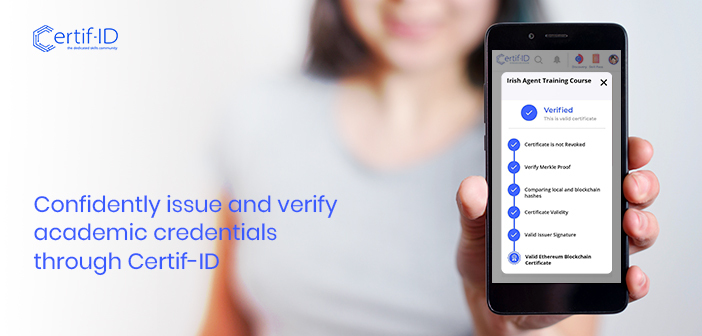Your graduates share their course completion certificates in many places; on social media, with employers, higher education institutes, banks and more.
Every organisation receiving the certificates will need to verify that the qualifications are genuine. And, as we all know, verifying traditional paper-based certificates is time consuming, expensive and requires third parties to be involved.
And, there is no way of knowing if a certificate is being misused or forged. Your graduates can easily misplace it or damage it.
To solve these two challenges of verifying academic credentials and ensuring certificate authenticity, Certif-ID has harnessed the power of blockchain technology.
Here, we’ll delve deeper into how blockchain technology simplifies the process of certificate issuance and verification, while upholding trust and transparency.
Use blockchain to secure academic credentials
A blockchain is a distributed network of systems that records transactions. Each record or block is saved on multiple devices and cannot be modified. If a change is made, a new block is created with the latest changes. And, it can be traced to its source using the blockchain trail of transactions.
So, when an institute issues a digital certificate over blockchain, a permanent record is created immediately. This record cannot be changed by any third party. It can only be viewed and verified by anyone who has access to it.
Only the certificate issuing institution holds the power to renew, revoke, reissue or make any other changes to the certificate. This makes it traceable and it cannot be changed. If you are considering blockchain technology to issue academic credentials, it is undoubtedly a powerful choice.
 Adopting blockchain technology doesn’t have to be challenging
Adopting blockchain technology doesn’t have to be challenging
Certif-ID has made it easy.
An institute can simply sign up to Certif-ID, create a profile, list courses and issue blockchain-powered digital certificates to graduates. The onboarding team will also hand-hold you through the entire process.
The students receiving the digital certificate will be able to access it on their email addresses as well as in their Certif-ID profiles.
A digital certificate issued on blockchain can contain a range of student details including:
- Issuing institute name and details
- Student name and ID
- Skills-levels achieved, internship completion and more
When your graduates share their digital certificates, it can be instantly verified by the person having access to it.
Benefits of academic credential verification using blockchain
- No third party involvement: On the Certif-ID platform, the data only flows between the issuing body and the student receiving the digital certificate. This singular flow of data is 100% tamper-proof. It removes any possibility of errors or manipulation and results in highly transparent operations.
- Reduced operational time and cost: Paper-based certificates can take days and weeks to issue, verify and dispatch. Moreover, the costs associated with logistics can be hefty. Using Certif-ID, the time associated with student onboarding, timely updation of credentials, as well as issuing of digital certificates is almost instantaneous. Educational institutes can issue, track and verify multiple credentials of different students and courses at the same time.
- Simpler background verification checks for recruiters: Once a student shares a digital certificate, recruiters can verify their credentials with a few clicks. This removes the need for third party verification and reduces the time and manual effort spent.
- Make room for micro credentialing: As almost any form of data can be encrypted into a block and certificate, institutes can issue micro-credentials to recognise learning and development, course project details, etc. This would certainly help both students and recruiters in the age of niche skills.
Also read: Cross-Border Skills Recognition Doesn’t Have to Take Years! https://nationalskillsnetwork.in/cross-border-skills-recognition-doesnt-have-to-take-years/
Certif-ID’s primary aim is to bridge the rising skills gap and bring a sense of trust and transparency in the education and employment sector. With the rising skills shortage across sectors and geographies, professionals having academic credentials on blockchain can prove their skills across borders and find jobs easily. This will help both companies facing a shortage of workers and professionals looking for job opportunities.
Certif-ID is leveling the playing field for everyone involved in the upskilling movement. To know how you can start using the Certif-ID platform to your advantage, please schedule a demo.














Comments 1